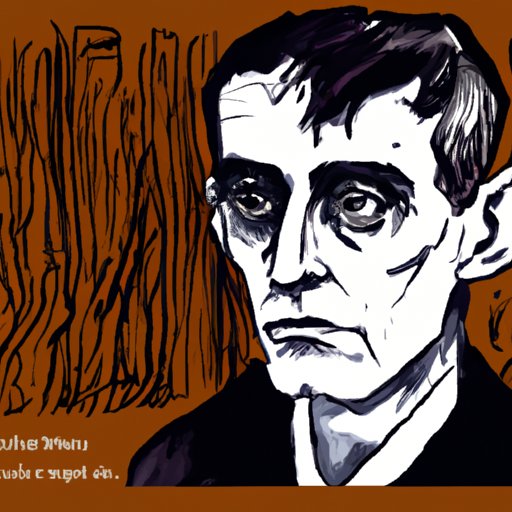Introduction
Franz Kafka’s “The Hunger Artist” is a short story that has captivated readers for decades. Originally published in 1924, this story follows the life of a hunger artist who has devoted his life to fasting. While it may seem like a strange concept, the story offers a profound exploration of isolation, art, and existential longing. In this article, we will explore the emotional impact of Kafka’s “The Hunger Artist” and its lasting legacy.
Exploring the Emotional Impact of Kafka’s Hunger Artist
Kafka’s “The Hunger Artist” is a complex work of literature that touches on many different themes. At its core, the story is about a man who has devoted his life to fasting. While this may seem like an odd concept, it serves as a powerful metaphor for modern existentialism. The story follows the hunger artist as he searches for a sense of purpose and meaning in a world that does not understand him.
A Close Analysis of Isolation in the Hunger Artist
One of the most striking aspects of Kafka’s “The Hunger Artist” is its exploration of isolation. Throughout the story, the hunger artist is isolated from those around him. As noted by literary scholar Janice Miller in her analysis of the story, “The Hunger Artist’s isolation is both literal and metaphorical; he is physically alone in his cage and also figuratively isolated from society due to his inability to conform to society’s expectations.” This sense of isolation is further underscored by the fact that the hunger artist is never able to find someone who truly understands him.
Examining the Role of Art in the Hunger Artist
At the heart of “The Hunger Artist” is an exploration of the role of art in our lives. As the hunger artist himself says, “I couldn’t find the food I liked. If I had found it, believe me, I should have made no fuss and stuffed myself like you or anyone else.” Here, Kafka is suggesting that art can be a means of finding fulfillment in a world that does not always understand us. By embracing his unique form of artistry, the hunger artist is able to find a sense of purpose and meaning in his life.
The Unsatisfied Longing of the Hunger Artist: A Character Study
Kafka’s “The Hunger Artist” offers a profound exploration of the human condition. Through the character of the hunger artist, Kafka is able to examine themes such as existential longing, the paradox of fasting, and the power of subversion. Let’s take a closer look at each of these themes.
Understanding the Paradox of Fasting
At the heart of “The Hunger Artist” is the paradox of fasting. On the one hand, the hunger artist is able to find a sense of purpose and fulfillment through his act of fasting. On the other hand, the hunger artist is never able to find true satisfaction. As noted by literary critic Robert Alter in his analysis of the story, “Kafka suggests that any attempt to gain satisfaction through an artificial privation like fasting is doomed to failure.” In this way, Kafka’s “The Hunger Artist” serves as a powerful reminder of the futility of attempting to find fulfillment through artificial means.
Examining the Metaphor of Modern Existentialism
In “The Hunger Artist,” Kafka is able to explore the concept of modern existentialism. Through the character of the hunger artist, Kafka is able to examine the idea of searching for meaning in a seemingly meaningless world. As noted by literary critic Irving Howe in his analysis of the story, “The Hunger Artist is a parable of modern existence, with its struggles against boredom and emptiness.” By exploring the theme of modern existentialism, Kafka is able to make a powerful statement about the human condition.
Exploring the Power of Subversion
Kafka’s “The Hunger Artist” also offers an exploration of the power of subversion. Throughout the story, the hunger artist is able to challenge the status quo and reject the conventions of society. As noted by literary scholar Gail Finney in her analysis of the story, “The Hunger Artist challenges the very foundations of accepted social norms by refusing to conform to them.” In this way, Kafka is able to make a powerful statement about the potential of subversion and its ability to challenge the status quo.
Conclusion
In conclusion, Franz Kafka’s “The Hunger Artist” is a powerful work of literature that offers a profound exploration of isolation, art, and existential longing. Through the character of the hunger artist, Kafka is able to examine themes such as the paradox of fasting, the metaphor of modern existentialism, and the power of subversion. As a result, “The Hunger Artist” remains a timeless classic that continues to captivate readers today.
(Note: Is this article not meeting your expectations? Do you have knowledge or insights to share? Unlock new opportunities and expand your reach by joining our authors team. Click Registration to join us and share your expertise with our readers.)
